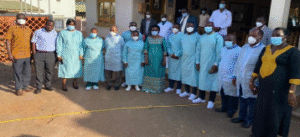
By Dr. Susan Nabadda, Executive. She is the prominent figure in the field of public health and laboratory medicine in Uganda and the current chair of the Lab Director Forum in Africa.
Diagnostics as the First Line of Defense In global health, one fundamental truth holds firm: we cannot treat what we cannot diagnose. Diagnostics are the heart of any health system. Whether its managing pandemics or treating a child in a rural clinic, accurate diagnosis guides effective treatment, prevents misuse of medication, curbs antimicrobial resistance (AMR), and saves lives. Diagnostics underpin universal health coverage, epidemic preparedness, and disease elimination. They must lead our response across maternal health, AMR, and pandemic threats.
Uganda’s Diagnostic Transformation
Uganda has transitioned from reactive to frontline proactiveness in its approach to diagnostics, especially during major outbreaks like COVID-19, Ebola, Mpox, and in combating AMR. This progress stems from strong a strong national laboratory tiered network supported by strong political will, local innovation and sustained technical partnerships.
The transformative agenda driven by the Ministry of Health has prioritized laboratories as essential to achieving universal health coverage and managing both endemic diseases (HIV, TB, HBV) and emerging threats (Ebola, Marburg, COVID-19, NCDs, and AMR).
The key to this progressive and sustainable success has been;
- The establishment of National Laboratory Directorate that coordinates and advocates for laboratory services and mobilizes
- Setting up of over 100 diagnostic hubs across the country, tailored to facility levels serivces, bringing diagnostics closer to the comunity.
- Robust integrated National sample transport and result return system covering 95% of health facilities, ensuring timely testing and reporting.
- Strengthening national and regional reference laboratories, equipped to handle priority pathogens and conduct advanced testing like genomic sequencing including Central Public Health Laboratories, National TB Reference Lab and the National Microbiology and Genomics Labs.
These collaborate with institutions like Uganda Virus Research Institute, Makerere University, and the Joint Clinical Research Centre.
- Introducing mobile laboratories that respond rapidly to outbreak epicenters, allowing immediate diagnosis and public health action.
- Integrating digital lab information systems that improve data flow and enable real-time reporting for better patient and epidemic management.
- Establishing over 20 AMR surveillance sentinel sites, guiding appropriate antibiotic use and stewardship.
- Operationalizing a national test and treat policy for diseases like malaria, HIV, TB, hepatitis B, and syphilis— ensuring diagnosis before treatment begins.
- Widespread deployment of point- of-care diagnostics, such as 298 GeneXpert and 200 m-PIMA machines, particularly in hard-to- reach areas, to speed up diagnosis and treatment initiation.
- Having a pool of skilled laboratory workforce that supports timely, accurate testing.
- robust quality assurance framework, anchored by an ISO 17043-certified lab. Setting up a Quality assurance framework anchored by an ISO 17403 certified laboratory producing proficiency testing panels for over 20 diagnostic scopes (e.g., HIV viral load, TB microscopy, COVID-19 PCR, hepatitis B, HPV)
- having more 90 ISO 15189-accredited laboratories including public, private, research and academic laboratories ensuring high- quality, reliable results.
Uganda has established a decentralized, data-driven laboratory network fully integrated into the national health infrastructure. Health workers can diagnose treatment—an essential step toward effective care. Thanks to these systems, Uganda has established a decentralized, data-driven laboratory network fully embedded into the national infrastructure.. Health workers can diagnise quickly and accurately before initiating.
However, challenges remain. Many lower-level facilities still lack basic diagnostics. Sample transport can be delayed during emergencies. Human resource gaps persist, particularly in rural regions. Supplies are often insufficient, and funding for laboratory services remains inadequate. Without addressing these systemic gaps, Uganda’s journey toward universal health coverage may stall.
Invest Now or Pay Late
We don’t need more equipment in stores. We need functioning systems in clinics and Uganda is proving that it’s possible. Uganda’s experience proves that when laboratories are prioritized, patients win.
The work ahead calls for renewed investment, visionary leadership, and a collective belief that no diagnosis should be delayed or denied. Investing in diagnostics is not negotiable. We must shift from vertical, reactive funding to integrated, sustainable investment. We’re not just testing samples. We’re protecting lives, restoring trust, and building resilience for future generations.
The road ahead demands more innovation, stronger partnerships, and courageous advocacy. You cannot treat what you do not diagnose. But when you diagnose well, you do more than treat. You give people back their future.

